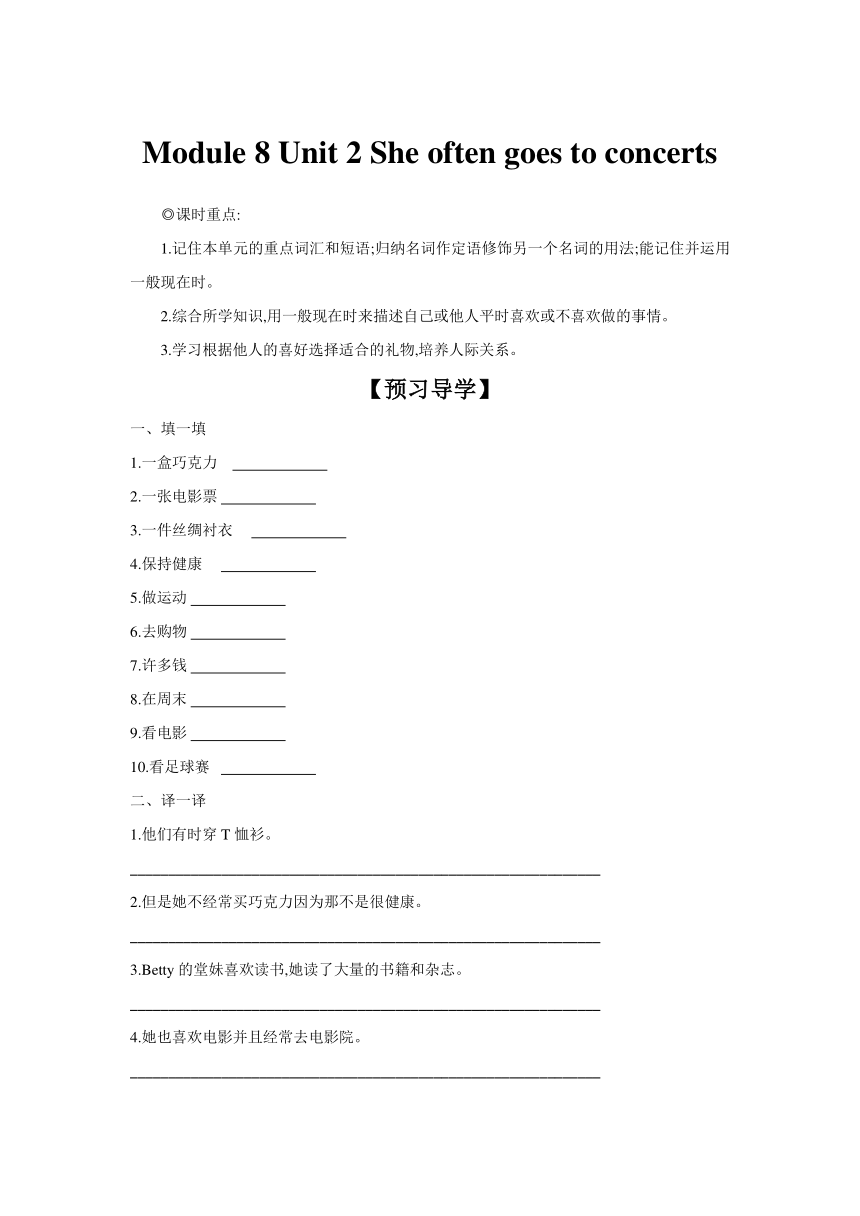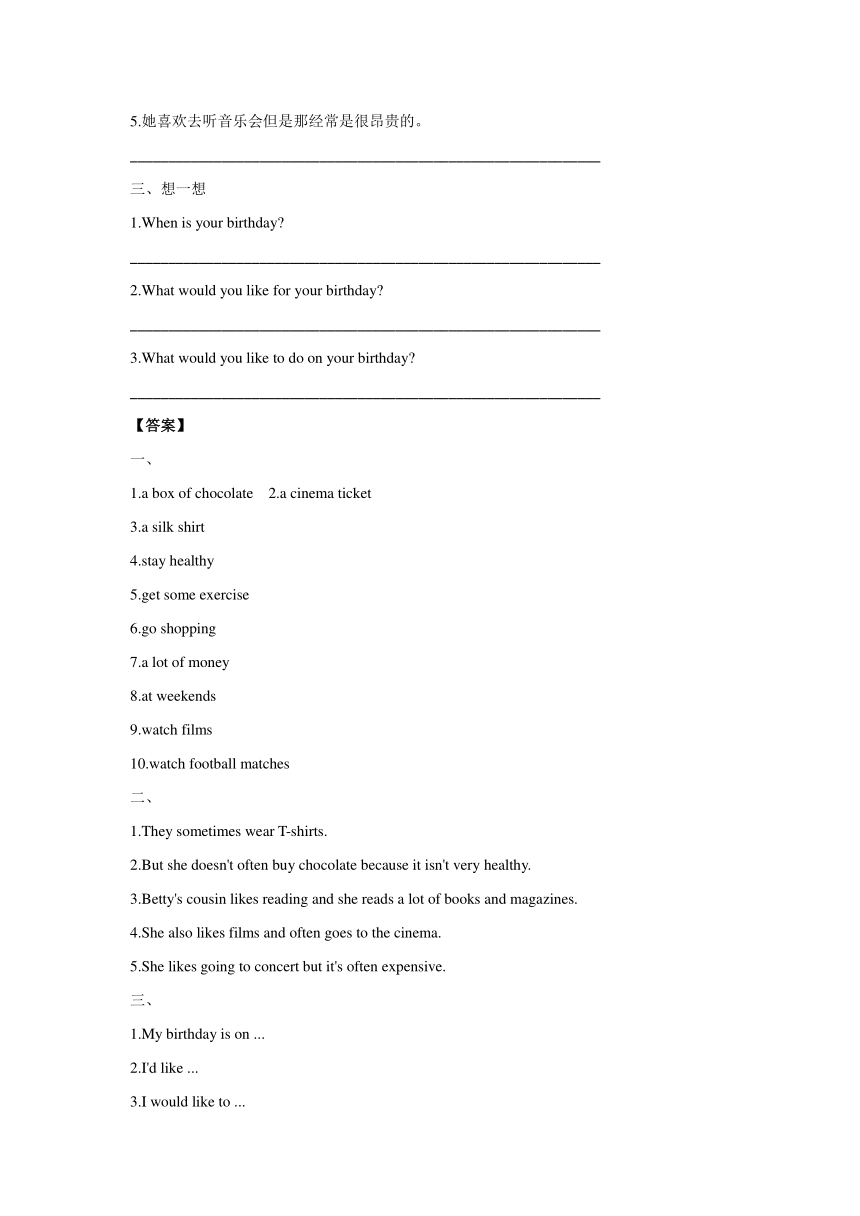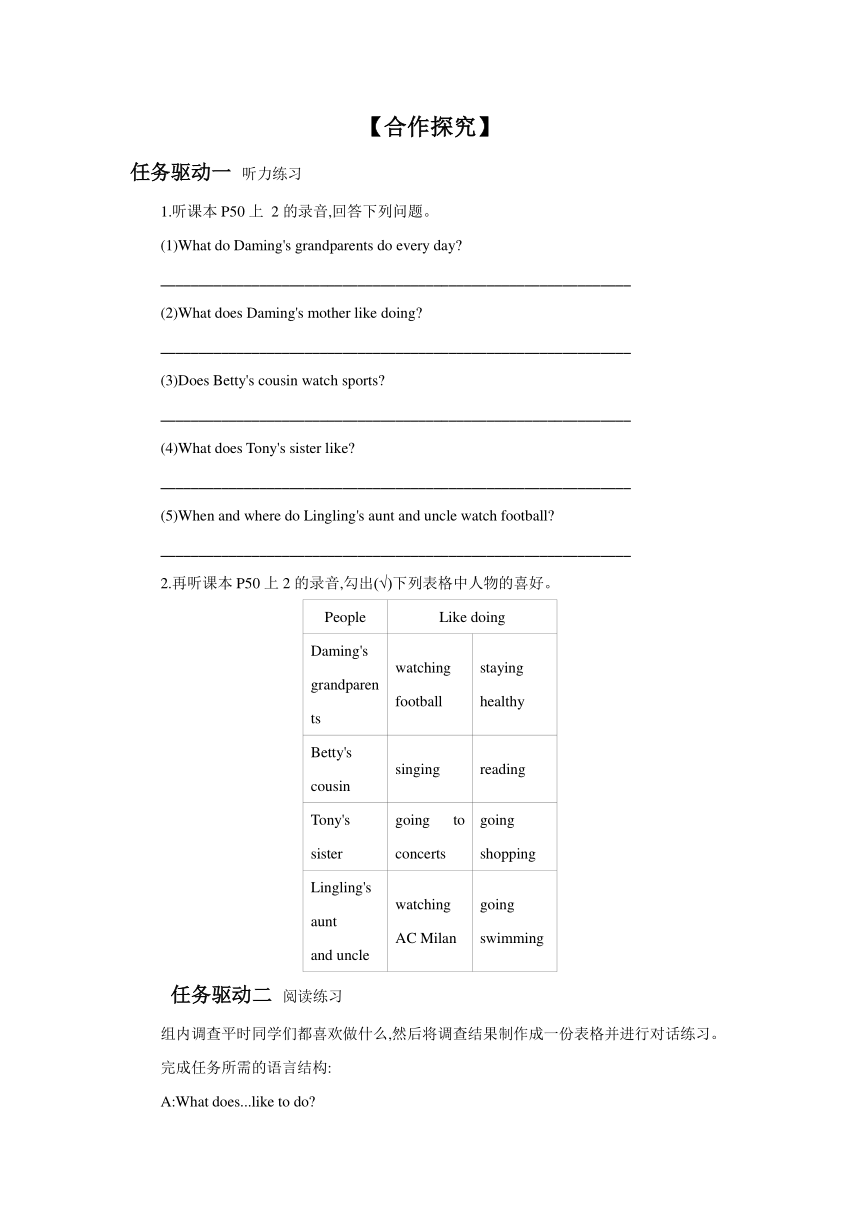Module 8 Unit 2 She often goes to concerts 学案 初中英语外研版七年级上册(含答案)
文档属性
| 名称 | Module 8 Unit 2 She often goes to concerts 学案 初中英语外研版七年级上册(含答案) |

|
|
| 格式 | docx | ||
| 文件大小 | 22.9KB | ||
| 资源类型 | 教案 | ||
| 版本资源 | 外研版 | ||
| 科目 | 英语 | ||
| 更新时间 | 2024-02-28 07:26:33 | ||
图片预览



文档简介
Module 8 Unit 2 She often goes to concerts
◎课时重点:
1.记住本单元的重点词汇和短语;归纳名词作定语修饰另一个名词的用法;能记住并运用一般现在时。
2.综合所学知识,用一般现在时来描述自己或他人平时喜欢或不喜欢做的事情。
3.学习根据他人的喜好选择适合的礼物,培养人际关系。
【预习导学】
一、填一填
1.一盒巧克力
2.一张电影票
3.一件丝绸衬衣
4.保持健康
5.做运动
6.去购物
7.许多钱
8.在周末
9.看电影
10.看足球赛
二、译一译
1.他们有时穿T恤衫。
______________________________________________________________
2.但是她不经常买巧克力因为那不是很健康。
______________________________________________________________
3.Betty的堂妹喜欢读书,她读了大量的书籍和杂志。
______________________________________________________________
4.她也喜欢电影并且经常去电影院。
______________________________________________________________
5.她喜欢去听音乐会但是那经常是很昂贵的。
______________________________________________________________
三、想一想
1.When is your birthday
______________________________________________________________
2.What would you like for your birthday
______________________________________________________________
3.What would you like to do on your birthday
______________________________________________________________
【答案】
一、
1.a box of chocolate 2.a cinema ticket
3.a silk shirt
4.stay healthy
5.get some exercise
6.go shopping
7.a lot of money
8.at weekends
9.watch films
10.watch football matches
二、
1.They sometimes wear T-shirts.
2.But she doesn't often buy chocolate because it isn't very healthy.
3.Betty's cousin likes reading and she reads a lot of books and magazines.
4.She also likes films and often goes to the cinema.
5.She likes going to concert but it's often expensive.
三、
1.My birthday is on ...
2.I'd like ...
3.I would like to ...
【合作探究】
任务驱动一 听力练习
1.听课本P50上 2的录音,回答下列问题。
(1)What do Daming's grandparents do every day
______________________________________________________________
(2)What does Daming's mother like doing
______________________________________________________________
(3)Does Betty's cousin watch sports
______________________________________________________________
(4)What does Tony's sister like
______________________________________________________________
(5)When and where do Lingling's aunt and uncle watch football
______________________________________________________________
2.再听课本P50上2的录音,勾出(√)下列表格中人物的喜好。
People Like doing
Daming's grandparents watching football staying healthy
Betty's cousin singing reading
Tony's sister going to concerts going shopping
Lingling's aunt and uncle watching AC Milan going swimming
任务驱动二 阅读练习
组内调查平时同学们都喜欢做什么,然后将调查结果制作成一份表格并进行对话练习。
完成任务所需的语言结构:
A:What does...like to do
B:He/She likes...
A:Does ...like ...
B:No, he/she doesn't. He/She likes ...
...
·学习小助手·
英语中,名词可以作定语修饰名词,作定语的名词通常用单数,如:an apple tree/ some apple trees。但是,当man和woman作定语时,其单复数要跟被修饰词保持一致,如,a man teacher/ some men teachers。
【答案】
任务驱动一
1.(1)They get some exercise in a park near their home.
(2)She likes going shopping and always buys expensive clothes.
(3)No, she doesn't.
(4)She likes music.
(5)They watch football on television at weekends.
2.staying healthy√ reading√ going to concerts√
watching AC Milan√
【知识超市】
●Betty's cousin likes to go to the cinema. Betty的堂妹喜欢看电影。
like to do sth.为固定短语,意为“喜欢做某事”,常指偶尔喜欢做某事;like doing sth.也意为“喜欢做某事”,侧重于指长期性的爱好。例如:
Li Ming likes playing football. 李明喜欢踢足球。(侧重指长期性的爱好)
I like to stay home today. 今天我想待在家里。(偶尔喜欢待在家里)
[做一做]单项选择。
( )I usually like but today I like with the children.
A.watching TV; playing games B.to watch TV; to play games
C.to watch TV; playing games D.watching TV; to play games
【答案】
D
●Tony's sister often buys CDs of her favourite songs. 托尼的妹妹经常买她最喜欢的歌曲的CD。
本句的时态是一般现在时。一般现在时表示经常性或习惯性的动作或陈述事实。通常与every day(每天), always(总是),usually(通常), often(经常), sometimes(有时)等时间状语连用。例如:
The sky is blue. 天空是蓝色的。(表示事物的特征、状态)
She gests up at 6:30 every day. 她每天六点半起床。(表示经常性或习惯性的动作)
一般现在时的句型转换:
1.变一般疑问句:
(1)当句子中有be动词或情态动词时,将be动词或情态动词提到主语之前。其肯定回答:“Yes, 主语所对应的人称代词+be/情态动词”。否定回答:“No, 主语所对应的人称代词+be/情态动词+not.”,其中be动词或情态动词常与not缩写。例如:She is a student. Is she a student
—Is your mother a teacher —No, she isn't. ——你妈妈是老师吗 ——不,她不是。
(2)当句子中没有be动词或情态动词时,在主语前加助动词,后面的谓语动词用原形。肯定回答:“Yes, 主语所对应的人称代词+do/does.”;否定回答:“No, 主语所对应的人称代词+don't/doesn't.。”
例如:He likes going shopping. Does he like going shopping
—Do you have a car —Yes, I do.
——你有车吗 ——是的,我有。
2.变否定句:
(1)当句子中有be动词或情态动词时,在be动词或情态动词后面直接加not。例如:
They can swim. They can't swim.
(2)当句子中没有be动词或情态动词时,在主语后的谓语动词前加don't 或doesn't,助动词后的谓语动词一定要还原为动词原形。例如:
Linda has a new scarf. Linda doesn't have a new scarf.
[做一做]单项选择。
( )1.Tony two brothers and he likes them very much.
A.have B.has C.will have D.having
( )2.—Does your aunt in Beijing
—Yes, she .
A.live; does B.lives; does C.living; is D.living; does
【答案】
1.B 2.A
◎课时重点:
1.记住本单元的重点词汇和短语;归纳名词作定语修饰另一个名词的用法;能记住并运用一般现在时。
2.综合所学知识,用一般现在时来描述自己或他人平时喜欢或不喜欢做的事情。
3.学习根据他人的喜好选择适合的礼物,培养人际关系。
【预习导学】
一、填一填
1.一盒巧克力
2.一张电影票
3.一件丝绸衬衣
4.保持健康
5.做运动
6.去购物
7.许多钱
8.在周末
9.看电影
10.看足球赛
二、译一译
1.他们有时穿T恤衫。
______________________________________________________________
2.但是她不经常买巧克力因为那不是很健康。
______________________________________________________________
3.Betty的堂妹喜欢读书,她读了大量的书籍和杂志。
______________________________________________________________
4.她也喜欢电影并且经常去电影院。
______________________________________________________________
5.她喜欢去听音乐会但是那经常是很昂贵的。
______________________________________________________________
三、想一想
1.When is your birthday
______________________________________________________________
2.What would you like for your birthday
______________________________________________________________
3.What would you like to do on your birthday
______________________________________________________________
【答案】
一、
1.a box of chocolate 2.a cinema ticket
3.a silk shirt
4.stay healthy
5.get some exercise
6.go shopping
7.a lot of money
8.at weekends
9.watch films
10.watch football matches
二、
1.They sometimes wear T-shirts.
2.But she doesn't often buy chocolate because it isn't very healthy.
3.Betty's cousin likes reading and she reads a lot of books and magazines.
4.She also likes films and often goes to the cinema.
5.She likes going to concert but it's often expensive.
三、
1.My birthday is on ...
2.I'd like ...
3.I would like to ...
【合作探究】
任务驱动一 听力练习
1.听课本P50上 2的录音,回答下列问题。
(1)What do Daming's grandparents do every day
______________________________________________________________
(2)What does Daming's mother like doing
______________________________________________________________
(3)Does Betty's cousin watch sports
______________________________________________________________
(4)What does Tony's sister like
______________________________________________________________
(5)When and where do Lingling's aunt and uncle watch football
______________________________________________________________
2.再听课本P50上2的录音,勾出(√)下列表格中人物的喜好。
People Like doing
Daming's grandparents watching football staying healthy
Betty's cousin singing reading
Tony's sister going to concerts going shopping
Lingling's aunt and uncle watching AC Milan going swimming
任务驱动二 阅读练习
组内调查平时同学们都喜欢做什么,然后将调查结果制作成一份表格并进行对话练习。
完成任务所需的语言结构:
A:What does...like to do
B:He/She likes...
A:Does ...like ...
B:No, he/she doesn't. He/She likes ...
...
·学习小助手·
英语中,名词可以作定语修饰名词,作定语的名词通常用单数,如:an apple tree/ some apple trees。但是,当man和woman作定语时,其单复数要跟被修饰词保持一致,如,a man teacher/ some men teachers。
【答案】
任务驱动一
1.(1)They get some exercise in a park near their home.
(2)She likes going shopping and always buys expensive clothes.
(3)No, she doesn't.
(4)She likes music.
(5)They watch football on television at weekends.
2.staying healthy√ reading√ going to concerts√
watching AC Milan√
【知识超市】
●Betty's cousin likes to go to the cinema. Betty的堂妹喜欢看电影。
like to do sth.为固定短语,意为“喜欢做某事”,常指偶尔喜欢做某事;like doing sth.也意为“喜欢做某事”,侧重于指长期性的爱好。例如:
Li Ming likes playing football. 李明喜欢踢足球。(侧重指长期性的爱好)
I like to stay home today. 今天我想待在家里。(偶尔喜欢待在家里)
[做一做]单项选择。
( )I usually like but today I like with the children.
A.watching TV; playing games B.to watch TV; to play games
C.to watch TV; playing games D.watching TV; to play games
【答案】
D
●Tony's sister often buys CDs of her favourite songs. 托尼的妹妹经常买她最喜欢的歌曲的CD。
本句的时态是一般现在时。一般现在时表示经常性或习惯性的动作或陈述事实。通常与every day(每天), always(总是),usually(通常), often(经常), sometimes(有时)等时间状语连用。例如:
The sky is blue. 天空是蓝色的。(表示事物的特征、状态)
She gests up at 6:30 every day. 她每天六点半起床。(表示经常性或习惯性的动作)
一般现在时的句型转换:
1.变一般疑问句:
(1)当句子中有be动词或情态动词时,将be动词或情态动词提到主语之前。其肯定回答:“Yes, 主语所对应的人称代词+be/情态动词”。否定回答:“No, 主语所对应的人称代词+be/情态动词+not.”,其中be动词或情态动词常与not缩写。例如:She is a student. Is she a student
—Is your mother a teacher —No, she isn't. ——你妈妈是老师吗 ——不,她不是。
(2)当句子中没有be动词或情态动词时,在主语前加助动词,后面的谓语动词用原形。肯定回答:“Yes, 主语所对应的人称代词+do/does.”;否定回答:“No, 主语所对应的人称代词+don't/doesn't.。”
例如:He likes going shopping. Does he like going shopping
—Do you have a car —Yes, I do.
——你有车吗 ——是的,我有。
2.变否定句:
(1)当句子中有be动词或情态动词时,在be动词或情态动词后面直接加not。例如:
They can swim. They can't swim.
(2)当句子中没有be动词或情态动词时,在主语后的谓语动词前加don't 或doesn't,助动词后的谓语动词一定要还原为动词原形。例如:
Linda has a new scarf. Linda doesn't have a new scarf.
[做一做]单项选择。
( )1.Tony two brothers and he likes them very much.
A.have B.has C.will have D.having
( )2.—Does your aunt in Beijing
—Yes, she .
A.live; does B.lives; does C.living; is D.living; does
【答案】
1.B 2.A
同课章节目录
- Starte
- Module 1 My teacher and my friends
- Module 2 My English lesson
- Module 3 My English book
- Module 4 My everyday life
- Module 1 My classmates
- Unit 1 Nice to meet you.
- Unit 2 I'm Wang Lingling and I'm thirteen years ol
- Unit 3 Language in use.
- Module 2 My family
- Unit 1 Is this your mum?
- Unit 2 These are my parents.
- Unit 3 Language in use.
- Module 3 My school
- Unit 1 There are thirty students in my class.
- Unit 2 The library is on the left of the playgroun
- Unit 3 Language in use.
- Module 4 Healthy food
- Unit 1 We've got lots of apples.
- Unit 2 Is your food and drink healthy?
- Unit 3 Language in use.
- Module 5 My school day
- Unit 1 I love history.
- Unit 2 We start work at nine o'clock.
- Unit 3 Language in use.
- Revision module A
- Module 6 A trip to the zoo
- Unit 1 Does it eat meat?
- Unit 2 The tiger lives in Asia.
- Unit 3 Language in use.
- Module 7 Computers
- Unit 1 How do I write my homework on the computer?
- Unit 2 When do you use a computer?
- Unit 3 Language in use.
- Module 8 Choosing presents
- Unit 1 I always like birthday parties.
- Unit 2 She often goes to concerts.
- Unit 3 Language in use.
- Module 9 People and places
- Unit 1 We're enjoying the school trip a lot.
- Unit 2 They're waiting for buses or trains.
- Unit 3 Language in use.
- Module 10 Spring Festival
- Unit 1 Are you getting ready for Spring Festival?
- Unit 2 My mother's cleaning our houses and sweepin
- Unit 3 Language in use.
- Revision module B
